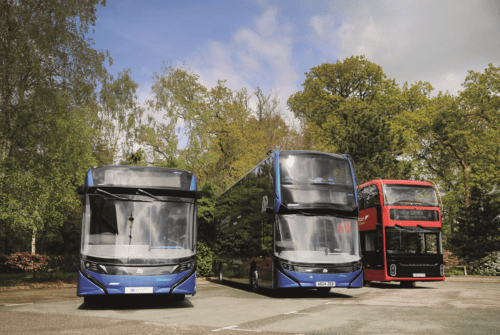
Jonathan Welch concludes his report from the ALBUM conference in Warrington, where the theme this year was ‘moving on up’
In last week’s issue, we looked at some of the themes, comments and issues from day one of the 2024 Association of Local Bus Company Managers (ALBUM) conference, held in Cheshire on 22-24 April and hosted by local municipal Warrington’s Own Buses, hot on the heels of the launch of its fleet of new Volvo BZL electric buses.
As always, the conference was accompanied by a trade show where exhibitors large and small were able to connect with existing clients face to face, network and make new contacts. Outside was a display of the latest new vehicles from Alexander Dennis, Volvo and Yutong.
The theme of this year’s conference was ‘moving on up.’ The second day of speakers, and the third and final day overall of the event, was opened again by regular host and former TV news reporter Dave Guest, who reported that the previous evening’s social event had been a great success, offering one of numerous more informal ways for attendees to network during the three-day event. There was a great mix of business and pleasure, he said.
The first of the day’s keynote speakers was Martin Dean, Managing Director of Go-Ahead Group’s UK Regional Bus division. Martin is responsible for overseeing the performance of Go-Ahead’s UK bus companies outside London; operations which stretch from Devon and Cornwall in the south-west right up to the north-east of England. Having previously held the role of Head of Business Development for Go-Ahead, charged with identifying new business opportunities at home and abroad, and with more than three decades’ experience in transport, he is also chairman of the Confederation of Passenger Transport (CPT). He is also Non-Executive Chairman of Edinburgh Trams, a convenient link back to last year’s conference in the Scottish city.
Speaking for the first time at an ALBUM conference, Martin said it was a delight to be able to attend despite not belonging to a company which is aligned with ALBUM’s membership. Instead, he was able to offer a different perspective, though one which is just as relevant to the SME sector as the big groups. Martin looked at how the socio-economic conditions of the age parallel the bus industry, and what we can extrapolate and learn from that when looking at the industry’s future.
Taking us back into the 1980s, Martin described what he called the three ages of deregulation; the path which has led the industry to where it is today. From 1986 to the mid-1990s he summarised as being an era of entrepreneurialism, followed from then until the Bus Services Act of the late 2010s which he labelled an era of consolidation. Finally came the hybrid age, a term he used to refer to the method of working rather than any particular transmission type.
Pre-historic
What went before, he asked. The pre-historic age was his answer, a time when networks were heavily controlled and regulated, when changes had to be approved, when restrictive practices made life less simple for passengers. An era when out-of-town services could only drop off on their way in and pick up on their way out once within a city boundary.
[…]By subscribing you will benefit from:
- Operator & Supplier Profiles
- Face-to-Face Interviews
- Lastest News
- Test Drives and Reviews
- Legal Updates
- Route Focus
- Industry Insider Opinions
- Passenger Perspective
- Vehicle Launches
- and much more!


